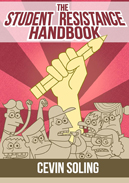
 |
A spin on Henry David Thoreau’s “Civil Disobedience,” Soling’s work focuses on eradicating compulsory schooling. A stark deviation from his graphic novels like The Jolly Elf and The Land of Plenty, this book still retains the same creative flair and humor of these other works while delivering stimulating discussions on the state of K-12 schooling. At a time when there are so many outlets to learn, Soling’s handbook embarks on a journey to conclusively prove that everything from the curriculum to the educators are cogs of a system that is not that disparate from prison.
From a young age, youth are conditioned to spend large chunks of their day boxed into a classroom in the name of quality education. What Soling suggests is for today’s youth to awaken to the effects of compulsory schooling and recognize that learning is ubiquitous and isn’t confined to a classroom and a teacher talking at you. The author goes into “take-no-prisoners” mode and encourages youth to stop at nothing short of eliminating compulsory schooling. Dwelling on it further, there is a profound level of inquisitiveness in the theory that, if school became optional, would students still be prompted to attend? If not, then what can schools do to truly foster learning?
Soling’s work weaves in elements of civil disobedience like free speech and free assembly so that the student, the learner himself, has a say in what and how they learn. The notion of being held captive in uncomfortable chairs for long hours is perhaps more relevant now than at any other time in history. Given the hypercompetitive nature of college admissions, students are glorifying “all-nighters” and are absorbing infinite levels of stress simply to get that letter at the beginning of the alphabet.
While this is as strong of a call to action if there ever was one, Soling’s work acts as an agent of change, one that gives students the tools to voice their displeasure and to empower themselves with the awareness that they have a say in how their lives are governed and that they are not mere pawns of the educational bureaucracy. What has the outcome of this systemic conditioning been so far? The answer seems to be mounting mental health issues among teens and young adults (sometimes even elementary kids) that revolve around anxiety and depression.
In this battle against academic oppression, Soling arms students with tools like social media, school and local newspapers, and more unorthodox outlets like designing t-shirts and flyers. Society is evolving toward a skills-based workforce where candidates who can clearly demonstrate a particular skillset supersede those with transcripts smeared with letters and acronyms like “A,” “AP,” “IB,” etc. On a holistic level, Soling’s premise of the handbook is not nearly as cavalier as it may seem. Countless families and students harbor these same thoughts and feelings regarding the Common Core educational system. In fact, it is an ideal read also for educators who need to fully grasp the realization that the status quo should not be allowed to continue. Fundamentally, Soling’s work strikes a more serious tone than his graphic novels, but the passion for the cause is just as unrelenting and delivered with the same force and clarity as these other works, keeping readers engaged throughout.
RECOMMENDED by the US Review